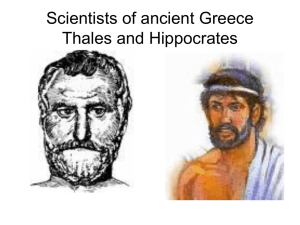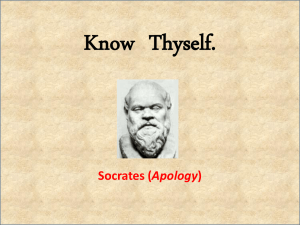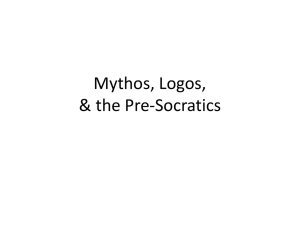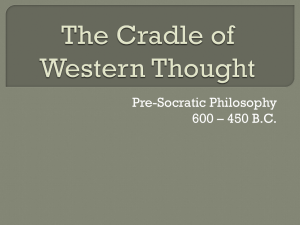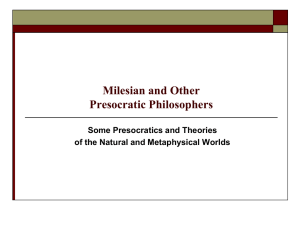PreSocrates
advertisement
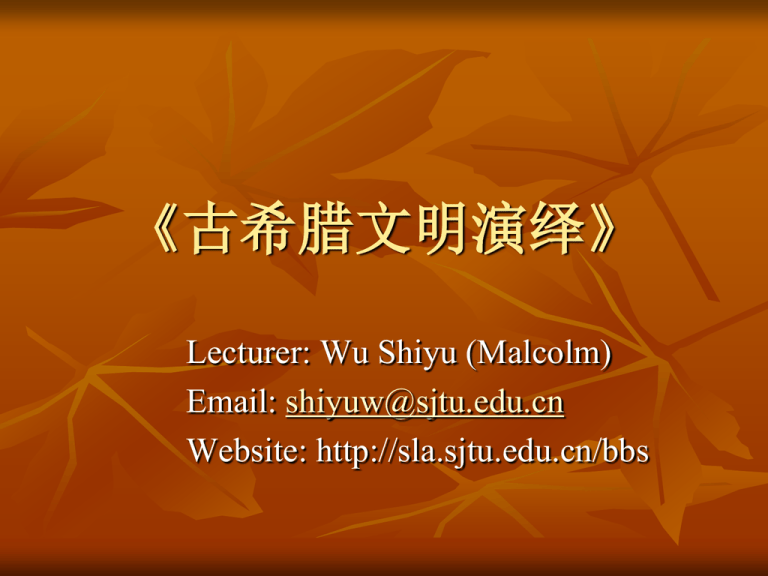
《古希腊文明演绎》 Lecturer: Wu Shiyu (Malcolm) Email: shiyuw@sjtu.edu.cn Website: http://sla.sjtu.edu.cn/bbs Greek Philosophy Pre-Socrates: Quest for Being (the archê) and Becoming Review: What Philosophy Means 1. “Philosophy” means “love [philia] of wisdom [sophia].” 2. But what is wisdom? Being able to answer the “perennial” or “fundamental” questions. Review: Subject Matter Our subject matter: The earliest period of western philosophy which begins in 585 with the work of Thales of Miletus and ends with Aristotle (322). The course will be divided into four distinct units: the Presocratics, Socrates, Plato, and Aristotle. Hesiod’s Being Tell me these things, Olympian Muses, From the beginning, and tell which of them came first. In the beginning there was only Chaos, the Abyss, But then Gaia, the Earth, came into being, Her broad bosom the ever-firm foundation of all, And Tartaros, dim in the underground depths, And Eros, loveliest of all the Immortals. Hesiod’s Theogony Thales, the Founder of philosophy Gave his date as 585 B.C. from Miletus; Thales was the first natural philosopher, the first thinker in the west to give what the Greeks called the “Logos”, the first to give logos of nature (Aristotle). What is a logos? A logos is a rational explanation. The word logos is present in many suffix of the English words. (Biology=a logos of life; Psychology= the logos of the soul or mind) What is a logos? “Of those who first pursued philosophy, the majority believed that the only principles of all things are principles in the forms of matter. For that out of which all existing things are composed and that out of which they originally come into being, that into which they finally perish, the substance persisting, but changing in all of its attributes. ” Quoting from Aristotle Thales is called the first philosopher precisely because he is the first, according to Aristotle, to give logos of nature. Thale’s Being (the archê) Thales believed that the “principle” of all things is material, is in the form of matter. The word principle(wonderful and extremely important) The Greek word archê can be translated as principle, as origin, as beginning, as source. It also can mean ruler. So perhaps what it means is the beginning which then rules over everything that follows. (archaic, archaeology) The archê then is the beginning, not in the sense of time, but the beginning, the fundamental origin of everything else. Thale’s Being (the archê) “The archê is water.” (Thales) Aristotle speculates how Thales could’ve come up with this idea, that is, the origin of all things is water. “Maybe Thales got the idea from seeing that nourishment of all things is moist, and the hot itself comes to be from the moist.” (Aristotle) Thales Thales of Miletus One of the Seven Wise Men Thales: Quest for Being Thales is an empirical thinker, who use sense to experience in order to get information or knowledge about the world; uses his eyes, his ears in order to understand the world. From all of the observations, Thales derived a conclusion: Arche, the principle, the origin was water. Thales of Miletus With the spirit of free inquiry, Greek thinkers then began to challenge the traditional and established ideas, and also present their own. Using his reasoning capacity, using his senses, using his mind. (primitive, childish, but revolutinary) It’s the battle that Plato 200 years later would describe as the old battle between philosophy and poetry. The Milesian School Thales (585 B.C.), Anaximander (610-540 B.C.), and Anaximenes (585-528 B.C. ). The Milesian School began their quest for being (the archê), that is, how the world is originated and what is it made up of? They were interested in looking for a unifying element, asking the question: what is there behind all the constant change? In their search for the archê(the origin of all becoming), each of the three philosophers would come up with their own theory. Anaximander (610- 540 B.C.) The second thinker of the Milesian School and student of Thales Agreed with Thales that the world has an origin (archê) that can be comprehended by rational thought. Disagreed with Thales on what the archê was. Where Thales claimed water, Anaximander held that the archê is not in ordinary, limited, determinate substance like water. In his point of view, “the indefinite,” to apeiron, was the archê. The term to apeiron in Greek could be translated as “the indefinite,” “the unlimited,” or “the indeterminate.” (to=the; apeiron=indefinite). The principle of all things, Anaximander maintained, is not an element, be it air, water, earth or fire. Neither is it something in between. He claimed that those elements could not explain all of the opposites found in the universe. The one that can explain is the substance to apeiron, which can eternally give birth to whatever will be. He explained that the origin of the Universe is the separation of opposites in the primal matter. And then all dying things are returning to apeiron, the mass from which they came. 他是这样写作的——一个典型的哲学家, 只要还没有被外异的要求夺去自然质朴的 品质,就会这样写作:以风格宏伟、勒之 金石的字体,句句都证明有新的启悟,都 表现出对崇高沉思的迷恋。每个思想及其 形式都是通往最高智慧路上的里程碑。作 出解释呢? Anaximander有一回这样言简意赅地说道: “事物生于何处,则必按照必然性毁于何 处;因为它们必遵循时间的秩序支付罚金 ,为其非公义性而受审判。” 一个真正的悲观主义者的神秘箴言,铭 刻在希腊哲学界石上的神谕。(让我想起 米利都这个城邦的命运) 他停留在浓密的阴影里,这阴影象巨大的 鬼魂一样笼罩在这样一种世界观的峰巅。" 不确定者"如何能堕落为确定者,永恒者如 何能堕落为暂时者,公义者如何能堕落为 非公义者呢?我们愈是想接近这个问题, 夜色就愈浓。 Thales and Anaximander Thales, as an empiricist, using his ability to make observation about the world, and then concluding from his observations that the world at its core must be water. Anaximander, however, rejects this view of his teacher, rejecting what it seems to be Thales’ most positive contribution to the development of Western philosophy. Thales and Anaximander The archê, in his view, is responsible for everything else and therefore the archê must be fundamentally different from everything else (everything in world of becoming). Seen from this perspective, Anaximander is a kind of rationalist, using pure reasoning in order to arrive at his conclusion. Anaximander might have reasoned that if we want to preserve the concept of being, of the archê, then it was imperative to negate all limits. Anaximenes (585-528 B.C. ) Anaximenes, student of Anaximander, both agreed and disagreed with his teacher Anaximander. Agreed that there is a rational archê of the world and that there was a problem with Thales’ view that the archê is the water. Disagreed with Anaximander that the archê is the indeterminate (to apeiron). Anaximander’s to apeiron (the indeterminate), in Anaximenes’ view, is no different from Hesiod’ CHAOS, and both of them become unintelligible. Anaximenes (585-528 B.C. ) To think, Anaximenes argues, is to think about something determinate. For Anaximenes, the archê was air. Air is to be found everywhere, and it participates in physical processes. Air was acted on by natural forces and transformed into other materials, which came together to form the world through the processes of rarefaction (变稀薄) and condensation (浓缩). In Anaximenes’ view, air, like water, is intelligible, but air is superior to water for it is intangible. It is easier, therefore, to conceive of air as being responsible for all things. Anaximenes probably thought that air combined the advantages of Thales’ archê with the indefinite qualities of Anaximander’s to apeiron. With air, Anaximenes attempted to solve the problem of Being and Becoming, of the One and the Many. “He used simple and economical Ionic speech”。这是相对于Anaximander而言的。 阿那克西曼德虽然是用散文撰述哲学作品 的第一人,但仍保留诗意化的语言: “speaking of them thus in rather poetical terms”。阿那克西曼尼能够使用简单而经济 (simple and economical)的语言来进行哲 学写作,表明思辨能力以及语言的掌握、 运用能力的提高。 From the above, it can be seen that the Milesian School, in fact, started the first debate in Western philosophy which was held on the question “Is Being itself determinate or indeterminate?” Being and Becoming These are basic philosophical terms. The word becoming refers to the process coming into being and going out of being, coming into being and perishing. Becoming is a category. It labels a chunk of reality. That chunk of reality which goes through the process. By contrast, the word being refers to that which endures, something which is in the world of around, in the category of becoming into being and goes out of being. But being itself remains. It remains the same. Reformulate Hesiod’, Thales’, Anaximander’s and Anaximenes’ position. Xenophanes and Pythagoras Besides the Milsian School, also speculating about the world were two other thinkers in the 6th century BC, Xenophanes(570-475 B.C.) and Pythagoras(570-500 B.C.) . Xenophanes Born in Colophon, near Miletus, around 570. As neighbor to the Milesian School geographically, he was also a neighbor conceptually. On one hand, he began to use rational thought to probe into the world; on the other hand, he joined the Milesian quest for Being. Xenophanes For Xenophanes, god is the archê and god is the Being. God is one and permanent. God itself does not move, but it is able to move everything else by his mind alone. Xenophanes A critic of the Greek polytheism ( 多神教,多 神论). He asked the question: why, if the god insists on the morality for us, don’t they act the moral way? Why is Zeus having all these affairs? “Now I tell you something,” said Xenophanes, “If dogs have gods, they would look like dogs; if frogs have gods, they would like frogs. All of these are just our reading of ourselves into the world of a divine.” Xenophanes Xenophanes was also questioning social values and criticized the worship of Athletes of his age: “Why do we pay so much attention to these overweight muscled-up boxers who went to the Olympic Game? What have they ever done to serve anyone? Why should they receive food and board to their rest of their lives and make fortunes? ” Pythagoras (570-500 B.C.) Pythagoras of Samos Pythagoras While Thales was called “the father of philosophy”, Pythagoras was known as "the father of numbers". Pythagoras believed that everything was interrelated with mathematics, and thought that everything was able to be measured in rhythmic patterns or cycles, and the musical intervals could be explained mathematically. In sum, he worshipped in numbers, which, he believed, were permanent and stable. Pythagoras To him, Number is an excellent candidate for the archê. Pythagoras would take the side of Thales and Anaximenes in the Milesian debate. The archê must be determinate, and numbers have this feature. Numbers cannot be touched or seen or sensed in any way, but they can be thought, namely, they are intelligible like Thales’ water and Anaximenes’ air. Numbers are stable and permanent. Particular things, however, in Pythagoras mind, are sensible and they do change. And the Pythagoreans believed in reincarnation (再 投胎,再生,转世). Pythagoras was most famous as the founder of the Pythagorean Theorem In addition, Pythagoras also made significant contributions to philosophy and religious teaching in the late 6th century BC. The influence of Pythagoras has transcended the field of mathematics. The Pythagorean theorem: The sum of the areas of the two squares on the legs (a and b) equals the area of the square on the hypotenuse (c). Medieval woodcut showing Pythagoras with bells in Pythagorean tuning Pythagoras, the man in the center with the book, teaching music, in The School of Athens A kind of crisis has been developing in the sixth century, in the ancient Greek philosophy. Questions to discuss 1. Do you think that the world has an archê? If so, does it seem more plausible to you that it is determinate or indeterminate? 2. What might be some contemprary candidates for the archê? 3. The contemporary world is often described as “the age of the computer.” Are we living in Pythagorean times? 4. Do you think there are aspects of life that cannot be reduced to numbers? What might these be? Heraclitus (535-475B.C.)
